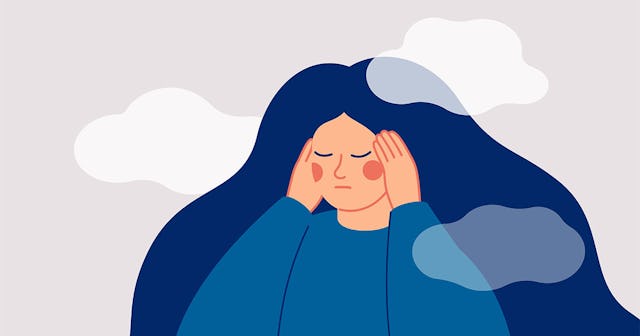Free-Floating Anxiety — Yes, You Probably Have It

Anxiety disorder is a common mental health disorder. In fact, millions of Americans have or live with this condition. It is estimated that 19 percent of the adult population has been (or will be) diagnosed with anxiety. And while anxiety can take many forms — from generalized and social anxiety to phobias and OCD — one of the most common types is free-floating anxiety, or a general sense of uneasiness that is not tied to any person, object, or situation.
“Free-floating anxiety is anxiety that cannot be pinned [down],” an article on Calm Clinic explains. “People who have generalized anxiety disorder, or GAD, experience free-floating anxiety very frequently. In such cases, it seems as if the anxiety just floats in and out, coming and going with no apparent cause.” However, individuals without GAD may experience free-floating anxiety as well.
While free-floating anxiety “often occurs with generalized anxiety disorder… it may also be present with other types of anxiety conditions,” an article by Very Well Mind adds.
Here’s everything we know about free-floating anxiety.
What is free-floating anxiety?
According to the American Psychological Association, free-floating anxiety is “a diffuse, chronic sense of uneasiness and apprehension not directed toward any specific situation or object.” Or, to put it another way, it is anxiety not tied to a person, place or thing. It can be experienced by individuals with anxiety disorder, panic disorders, PTSD, or OCD. Individuals without a mental health diagnosis can also have free-floating anxiety.
“Free-floating anxiety is not a distinct mental disorder recognized in the Diagnostic and Statistical Manual of Mental Disorders, fifth edition (DSM-5),” Very Well Mind explains. “Instead, it is a term used to describe the non-specific feelings of anxiety that people sometimes experience from time to time as well as with conditions such as generalized anxiety disorder.”
What are the symptoms?
While free-floating anxiety is not a diagnosable form of anxiety (or a distinct medical condition), the symptoms of free-floating anxiety are similar to that of generalized anxiety disorder.
Individuals with free-floating anxiety generally experience feelings of discomfort, discontent, fear, nervousness, restlessness, panic, unease and/or dread. Physical symptoms may also occur, including headaches, stomach aches, muscle tension and fatigue, and difficulty concentrating, irritability, excessive worry, and sleep disruptions are common.
What causes free-floating anxiety?
While the causes of free-floating anxiety are not known, several factors may contribute to this condition including:
- Stress. While the correlation between stress and free-floating anxiety has not been confirmed, long-term stress can cause anxiety disorders.
- Diet and exercise. For some, diet and exercise can trigger anxiety. “Without exercise, the body’s excess energy and stress hormones may become dysregulated,” Calm Clinic explains. “And that is associated with physical stress and anxiety disorders.”
- Brain chemistry. Another possible cause of free-floating anxiety is your brain chemistry, or the physical makeup of your mind. “People who experience anxiety may have differences in their brain structure or systems that contribute to the experience of free-floating anxiety,” an article on Very Well Mind states. “Neurotransmitter systems related to serotonin as well as a structure called the amygdala are both thought to contribute to feelings of anxiety.”
- Upbringing. You’re upbringing can also affect how you react — and your mood. According to Very Well Mind, children raised by anxious parents are more likely to experience elevated levels of anxiety during adulthood.
- Genetics. Genetics may also play a role, as mental health disorders can be hereditary.
How is free-floating anxiety treated?
The good news is that — like generalized anxiety — free-floating anxiety can be treated. Cognitive behavioral therapy, for example, can help you gain clarity and reframe your thinking. “CBT focuses on helping people identify the automatic negative thought patterns that contribute to feelings of anxiety,” Very Well Mind explains. “Once they learn to recognize these thoughts, people can then work to replace those patterns with more helpful ones.”
Exercise can be beneficial, particularly if your anxiety is triggered by stress and/or emotional dysregulation. “Exercise is extremely valuable as a tool for combatting anxiety,” an article by Calm Clinic states. “It releases neurotransmitters that create a calmer mood, burns off excess energy and stress hormones, and should regulate your hormones and tire your muscles in a way that creates a better feeling of relaxation.” And, in some cases, medication can be helpful.
Prescriptions like Xanax and Klonopin can be taken on an as-needed basis. However, medication should only be taken as prescribed. Consult a doctor and/or medical professional before starting or taking medication for anxiety.
This article was originally published on